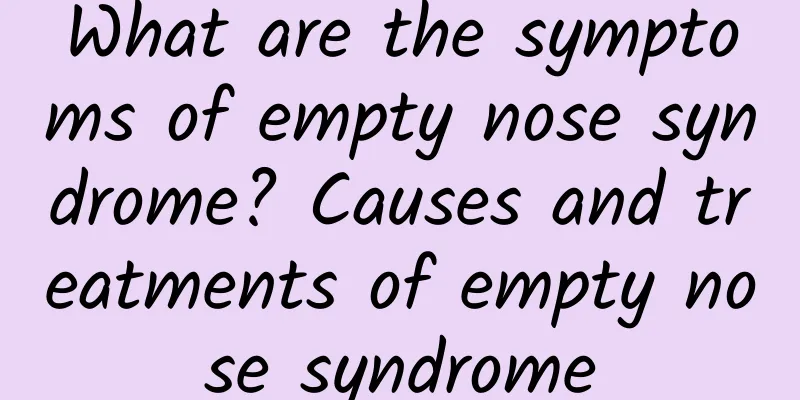What are the symptoms of empty nose syndrome? Causes and treatments of empty nose syndrome

|
Empty nose syndrome is commonly seen in people who have undergone turbinate surgery. It mainly occurs after turbinate surgery and is manifested by symptoms such as dry nasopharynx, blocked nose, and excess nasal mucosa. The main cause of this disease is improper surgery. The treatment method is to remove the middle and inferior turbinate through surgery. Below, we will introduce the symptoms, causes and treatments of empty nose syndrome. 1. Basic symptoms According to statements from some empty nose syndrome patients on the Internet, they developed symptoms such as dry nasopharynx, lung discomfort, nasal congestion, lack of energy, and insomnia after undergoing turbinate surgery; however, various follow-up examinations and diagnoses were normal, so they may be suspected of having symptoms such as mental illness. The mucous membrane of the nasal cavity, especially the mucous membrane of the nasal concha, can sense the entry of gas into the nasal cavity. If more mucous membrane is missing, the effect of "air conditioning" will be weakened, and you will feel a cool breeze directly entering the lungs when you breathe, which will make you feel very uncomfortable. The nasal cavity is located in the head, and any carelessness will affect the brain's nerve functions. Changes in these functions will have a great impact on people's emotions. In turn, bad emotions will cause patients to exaggerate their symptoms. The two influence each other to form a vicious circle, which will affect objective judgment. 2. Etiology The nasal cavity has the function of filtering dust in the air, heating the air and moistening the air. However, once the nasal cavity becomes over-patent due to unknown reasons or previous surgical treatment, causing the loss of the inherent functions of the nasal cavity, the so-called "empty nose syndrome" is formed. "Empty nose syndrome" caused by improper surgery. Most patients underwent surgery due to previous allergic rhinitis, hypertrophic rhinitis or sinusitis. The inferior turbinate or middle turbinate was excessively removed, resulting in excessive nasal obstruction. At this time, patients often complain of dry throat or foreign body, nasal congestion, dizziness, poor sleep quality, chest tightness and depression. The cause of empty nose syndrome is related to the most common destructive surgery of the nasal mucosa. About 20% of patients will develop empty nose syndrome after inferior turbinate resection. A normal nasal cavity has the function of filtering dust in the air and warming and humidifying the air inhaled into the nasal cavity. However, after suffering from dry rhinitis and atrophic rhinitis, the nasal mucosa becomes dry and atrophic. In severe cases, some tissues even become diseased and atrophic, causing the entire anatomical structure of the nasal cavity to mutate, thereby gradually losing the heating and humidification functions. At the same time, the nasal passages become wider, and the air goes directly into the lungs without being processed, which is like breathing through the mouth, causing a dry nasal cavity and uncomfortable lungs. Changes in the anatomical structure of the nasal cavity can stimulate the sinuses and peripheral nerves, causing symptoms such as headaches, which can make patients feel very painful. 3. Treatment Methods Partial resection of the middle and inferior turbinate is a classic surgical treatment method in otolaryngology. If some tissues are diseased or polyps grow, blocking the surrounding nasal passages, causing a loss of sense of smell, and the sinuses cannot drain normally and become inflamed, then part of the nasal concha will need to be removed. The purpose is to change the ventilation and make the nasal passages a little more unobstructed. |
>>: What are the symptoms of chronic cold stomach? Causes and treatments of chronic cold stomach
Recommend
Stomach pain and nausea
There are many clinical manifestations of stomach...
What to do if you have dull pain in your bladder
If you feel a dull pain in the bladder area, this...
What are the functions and effects of Snow Ganoderma?
If you often watch costume dramas, you will learn...
What to eat for insomnia caused by kidney deficiency? Three foods are most effective
Insomnia due to kidney deficiency is a common sym...
What are the oral antifungal drugs?
There are many types of medicines, most of which ...
There is a lump above the collarbone on the neck
There are many lymph nodes in the neck area, and ...
What causes acne on the head?
Scalp acne is a common disease and a type of skin...
How to treat and improve gonococcal infection
Gonococcal infection is one of the common sexuall...
How to do IVF best
In vitro fertilization is a method of artificial ...
Side effects of Baizi Yangxin Pills
As the name suggests, Baizi Yangxin Pills have a ...
What are the benefits of sweating after confinement?
We all know that it is necessary for women to sta...
How to regulate the coldness in the body?
Excessive coldness in the body will have adverse ...
What to do if you have diarrhea and dehydration? That’s the scientific method!
Although diarrhea is not a serious disease, prolo...
What are the ways to protect the cervical spine?
I believe that many office workers suffer from ne...
Can I detect pregnancy on day 4?
It is impossible to detect it in four days becaus...









